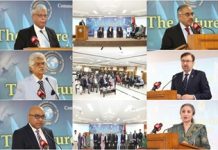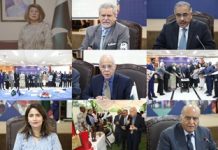The political tide in Pakistan has turned decisively against the regime and in favour of the Sharif brothers. Sharif has been defiant so far but the extent to which he is willing to push his hard line is not clear, though.
Three decisions of the Supreme Court of Pakistan restoration of the chief justice; the missing persons’ case; and the Sharifs’ right of return to Pakistan have rapidly changed Pakistan’s political scene. None of these decisions have made President General Pervez Musharraf and his political allies happy. Indeed, the political fallout of the independence of the judiciary, which these decisions amply demonstrate, has vitiated the environment for the regime.
The regime has faced continuous shocks since the refusal of the chief justice to step down on March 9 when he was summoned to the president’s camp office and asked to resign. In taking the decision to send the CJ home and later compounding that folly, the regime and its advisors utterly failed to understand the anger of the people over the dismissal of the chief justice and his public humiliation by security officials.
While public resentment against the regime was already accumulating and ran much deeper than the judiciary issue, it had earlier found little in terms of a political outlet. The CJ became a political event, a figure in the rallies organised by the lawyers’ community and an opportunity for the public to participate in them. And they did, in numbers that even a current political leader in Pakistan wouldn’t expect.
The rallies led by the lawyers damaged the regime in a number of ways. It exposed the most significant weaknesses of the regime; notably that it had no support in the enlightened and moderate civil society of Pakistan, which by any standard has been supportive of human rights, constitutionalism and democracy in the country. It is better to refer to these rallies as a social movement because it involved all other liberal sectors of society and politics on the sidelines, playing a very meaningful role. Each successful rally softened the political atmosphere, keeping the regime defensive and its supporters apologetic; even treasury members shied away from openly supporting the president’s decision against the CJ knowing it would amount to political hara-kiri.
While trying to defuse the situation as best he could, Musharraf, with his eyes set on re-election, turned to Benazir Bhutto using common local and foreign friends to broker a political deal. Both leaders, after some initial understanding, began to highlight in their statements and speeches that the political confrontation in Pakistan is between the moderate, enlightened sectors and the religious extremists. Many of us believe that extremism in Pakistan, whether ethnic, sectarian or religious, is not an independent factor but one of the adverse consequences of suffocating politics through an autocratic party system and prolonged political manipulations by the military. Musharraf has failed to convince any reasonable Pakistani that the emerging confrontation is not between the democratic forces and the military dictatorship.
If not Bhutto herself, her party leaders at the middle rung of the hierarchy do understand the real political challenge that Pakistan faces today: making a transition to democratic, constitutional rule and pushing the military back to the barracks.
Despite efforts to hide from the public the kind of political deal Bhutto has been negotiating, many believe is more about her personal concerns than the long-term interests of democracy or her Pakistan People’s Party. Her party workers, who have carried on the anti-establishment, progressive legacy, know how they would lose out to their political rivals even with the slightest hint of any alignment with Musharraf. Already, rumours of a political deal and the Abu Dhabi meeting between Bhutto and Musharraf have damaged the public standing of the PPP.
On the other hand, the Sharif brothers who many had written off, at least for the next general elections, have risen, phoenix-like from their ashes in the wake of the SC decision which has confirmed their rights as Pakistani citizens to return to the country. Anyone with the most basic understanding of the constitution would know that a citizen cannot contract himself out of rights granted by the constitution. But the government and its attorney general, himself a former high court judge, kept insisting that the Sharif brothers had a contractual obligation to stay out of the country for ten years. This was yet another confused and botched up response to an issue of fundamental constitutional rights.
The political tide in Pakistan has turned decisively against the regime and in favour of the Sharif brothers. The public mood in Pakistan, more in Punjab than perhaps the other provinces, favours Sharif because of the uncompromising line he has taken against the regime. The extent to which he is willing to push his hard line is not clear, though. He has sent mixed signals on reconciliation, extending an olive branch to the regime on the condition that Musharraf would not be a presidential candidate. This amounts to asking Musharraf to surrender, which may force the latter’s hand into upsetting normal politics. That could plunge the country into a deadly confrontation.
The fast-evolving political situation of the country has exciting possibilities of peaceful transition as well as frightening prospects of political confrontation. The responsibility for peaceful change rests on all major actors: the judiciary; the military leadership; and the leaders of the two major political parties.
Sharif is caught between the temptation to take the high tide and the fear that confrontation could lead to serious consequences. While he appears indecisive, his hawkish party leaders are upbeat and insist that he return immediately. Nawaz Sharif, now a major actor in this political drama, carries more responsibility than others. The political choices and the moves he makes will largely determine whether there is a peaceful transition or confrontation.
The author is a professor of Political Science at the Lahore University of Management Sciences.












